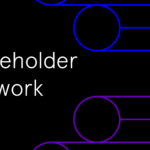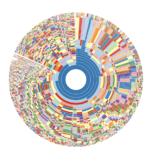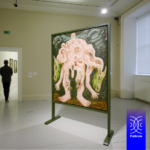News from polifonia
In order to answer research questions, musical heritage scholars need to combine diverse datasets ranging from music scores, audiovisual material to metadata. They need to identify similar entities and concepts implicitly present in the data, across different collections in different institutions. This process is currently mainly conducted manually, with the diverse results being rarely connected and shared in a way to be easily reused. To overcome the burden of this manual task, INTERLINK will focus on revealing and making compatible the entities and concepts hidden in digital music libraries and audiovisual archives. Pilot leader Jacopo de Berardinis tells in the latest video how they will do that with state-of-the-art methods for computational music analysis.
On Polifonia's YouTube channel, we publish a series of videos about the pilots and work packages. Last…
Andrea Poltronieri (UNIBO) is to present the paper The Harmonic Memory: a Knowledge Graph of harmonic patterns as a trustworthy framework for computational creativity at the Web Conference 2023, a yearly international conference on the topic of the future directions of the World Wide Web.
Andrea Poltronieri (UNIBO) is to present the paper The Harmonic Memory: a Knowledge Graph of harmonic…
Many people would probably answer this question with a clear “no”. Is it because they really believe computers cannot? Or maybe there is an inner voice that refuses to believe that musical creativity is not exclusive to humans? In the meantime, AI systems such as DALL-E and ChatGPT have already proven unprecedented performance for generating images and textual artefacts, and are now becoming ubiquitous in our society. What about AI-generated music?
by Jacopo de Berardinis & Max Tiel Many people would probably answer this question with a clear…
Polifonia pilot FACETS offers solutions for the challenging practice of content-based music retrieval. Pilot leader Raphaël Fournier-S’niehotta explains in the newest video on YouTube how this is helpful with navigating through music libraries.
On Polifonia's YouTube channel, we publish a series of videos about the pilots and work packages. This…
Following Polifonia’s successful Dom Tower excursion (ORGANS pilot) and Haptic Device workshops (ACCESS pilot), Polifonia again invited music lovers to come and explore music in relation to (art) history. Paul Mulholland (leader WP5) invited the Apollo Youth Panel to try out the Deep Viewpoints app with an exhibition at the Irish Museum of Modern Art.
Following Polifonia's successful Dom Tower excursion (ORGANS pilot) and Haptic Device workshops (ACCESS…
From Twitter
Newsletter
Stay updated with latest calls, project results & activities, programme news & events.
Sign up for our newsletter.

This project has received funding from the European Union's Horizon 2020 research and innovation programme under grant agreement N. 101004746



